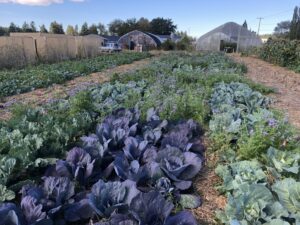
The Oregon State Legislature is considering Senate Bill (SB) 789 to protect the Willamette Valley’s vibrant vegetable seed industry from unrestricted canola production. Read on for more background, and visit these resources from the Oregon Organic Coalition to learn how you can help:
Letter to the Editor: Make Crop Protection Permanent
The Willamette Valley, full of fertile land and a unique growing climate, is a precious natural resource. The region is a premier location globally for growing certain species of vegetable seeds, including high-value Brassica seed crops. In fact, over 90% of cabbage seed varieties are grown in the Willamette Valley, allowing specialty seed producers to compete in an international market.
The total revenue generated by Brassica seed production in the Willamette Valley is estimated to be between $8.2 million and $25.0 million per year, with an average value of $15.2 million. Brassica seed production supports roughly 190 jobs directly and indirectly, as well as $9.3 million in direct and indirect labor income. (See this new economic assessment for more data.)
Allowing unrestricted planting of canola would irreversibly damage this specialty crop seed industry and put at risk a large percentage of the seed supply on which American farmers depend. Also at risk is the potential to grow this region’s specialty crop seed industry to the benefit of local economies. The Willamette Valley is one of the last remaining regions in the world suitable for large-scale vegetable seed production, and it must be protected.
A recent assessment by Highland Economics concluded that the high-value Brassica seed industry is worth far more to Oregon than low-value canola in terms of revenue and job creation. This assessment underscores the need for permanent protections and cites several oilseed alternatives to canola that do not pose the same threat while still providing benefits to farmers (e.g., flax, safflower, and sunflower, to name a few).
Past restrictions on canola production in this region were put in place after much community dialogue and research. The restrictions have long been deemed necessary for protecting livelihoods, seed product integrity, and regional economies. Seed companies both large and small, local and international, have invested in this region because of its unique climate and other factors that provide optimal seed growing conditions. These companies have also invested in this region because they have no choice: most of the other potential Brassica seed growing regions in the world (e.g., France and Australia) have been destroyed because canola planting was permitted in these areas.
Canola is a threat to the Willamette Valley’s thriving vegetable seed industry for three main reasons.First, canola cross-pollinates with other Brassicas, like turnips and broccoli, impacting the genetic integrity of these relatives if they cross, making the seed unmarketable. Canola cross-pollinates via wind and pollinators (some traveling as far as five miles). Canola seed pods are also prone to shattering, and canola seed remains dormant in the soil for two or more years. These volunteer canola plants serve as vectors for pollen transfer, creating significant challenges for containment. One California study found thousands of volunteer plants (per hectare) that resulted from dormant canola seed planted four years prior.
Secondly, most canola is genetically engineered (GE), posing challenges for farmers who need to meet customer expectations by avoiding GE material in their seed crops. For example, GE is an excluded method in certified organic production, including organic seed, and most organic seed suppliers (87%) responding to a national survey say that it is “very important” or “extremely important” for their company to offer organic and non-GMO seed with no or very low levels of GE traits.
Importantly, even if most canola didn’t contain a GE trait, canola production restrictions would still be necessary, because the genetic integrity of seed crops is threatened when seed producers cannot avoid unwanted traits, whether GE or not. As mentioned above, unwanted traits negatively impact variety purity, and thus the marketability, of specific seed crop varieties. A seed lot will be rejected if more than three out-crossed seed per 1,000 seed are found.
Cross-pollination isn’t the only problem. Increased disease and pest pressures are the third threat canola poses to vegetable producers (both seed producers and fresh vegetables). That is, canola acreage serves as reservoirs for important pests and diseases, such as the cabbage maggot and white mold. Research points to the need to take a precautionary approach by not allowing canola in this region.
Organic Seed Alliance works with seed growers in the Willamette Valley and throughout Oregon, both experienced and beginning farmers. SB 789 will ensure these seed growers continue to have access to the profitable market for vegetable seed production, including the organic market – an ever-growing sector of our seed supply.
We are at a timely crossroads. SB 789 would help protect the long-standing cultural and economic value of Oregon’s specialty crop seed industry, while allowing unrestricted planting of canola would very likely destroy it. The risks are well known, and the solution is clear: the Willamette Valley must be protected and preserved.
